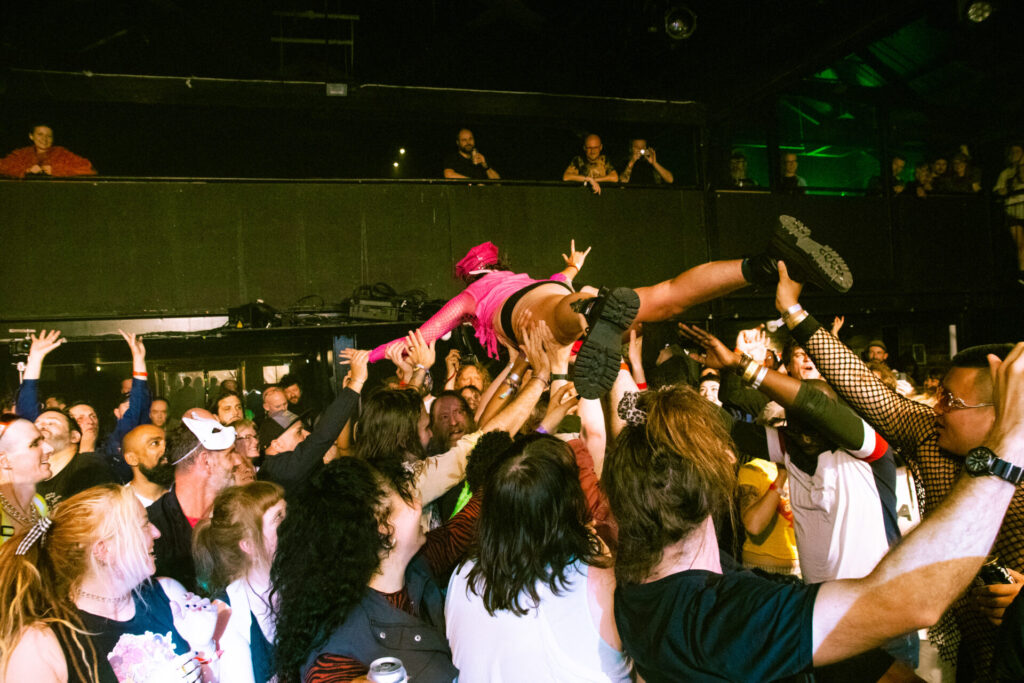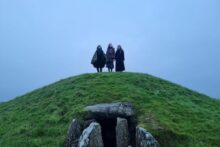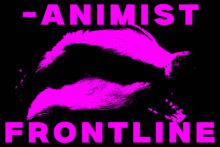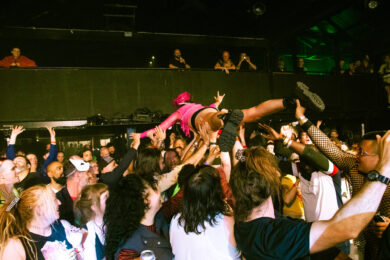In her introductory notes for the programme of this year’s festival, Supersonic artistic director Lisa Meyer reflects on heavy times for the underground cultural scene of which this festival is one of the UK’s biggest bastions. Having existed in the ‘everything-goes’ district of once-industrial Digbeth since it started in 2003, increasing gentrification of the area has now reached a point where the event’s future here – perhaps even in Birmingham as a whole – is under serious threat. It’s the first time, she notes, that the festival’s been forced to use a non-independent venue in the shape of the O2 Institute – emergency measures they were forced to take after property developers tanked a planned collaboration with a nearby warehouse at the last minute.
Beyond the second city too, with incoming waves of fresh austerity dampening what hope the ousting of the Conservatives might have raised, a summer marred by far right riots across the country, and no end in sight to the slaughter in Gaza, these feel like the heaviest of times; perhaps that’s why the programming at this year’s Supersonic feels even heavier than usual on the opening two days. From UKAEA’s caustic techno to the tempestuous howls of The Body and Dis Fig; Melt-Banana’s hyperspeed noise to the all-consuming goth gloom of Tristwch Y Fenywod.
And yet, as all of these acts prove, there’s real transcendence to be found in heavy music, where maxed-out beats, frayed guitars, screaming voices and tidal waves of noise can dovetail into a thing of transcendent beauty. When the volume is loud enough to rattle your very bones, it can be as blissful as a massage. As the world outside grows darker and more perilous, this effect only increases by juxtaposition. The presence of returning acts like last year’s headliners Lankum (this time in the guise of Ian Lynch and Radie Peat’s respective projects One Leg One Eye and ØXN), Matana Roberts (whose set last year was scuppered by Covid) and MC Yallah (whose denied visa also saw a 2023 set cancelled) only add to a sense of power in community.
On Sunday, Supersonic’s programming takes a turn for the more meditative, with the likes of Mary Lattimore’s serene harp playing nestled among picks from the new wave of experimental folk. One advantage of the O2 Institute is its copious balcony seating for tired feet, while Weird Walk’s takeover of the rooftop bar is the perfect salve. As long as festivals as uplifting, as communal, and as defiant as Supersonic continue to defy the odds, there is hope. Here are five of the finest sets that tQ caught this weekend.
Gazelle Twin
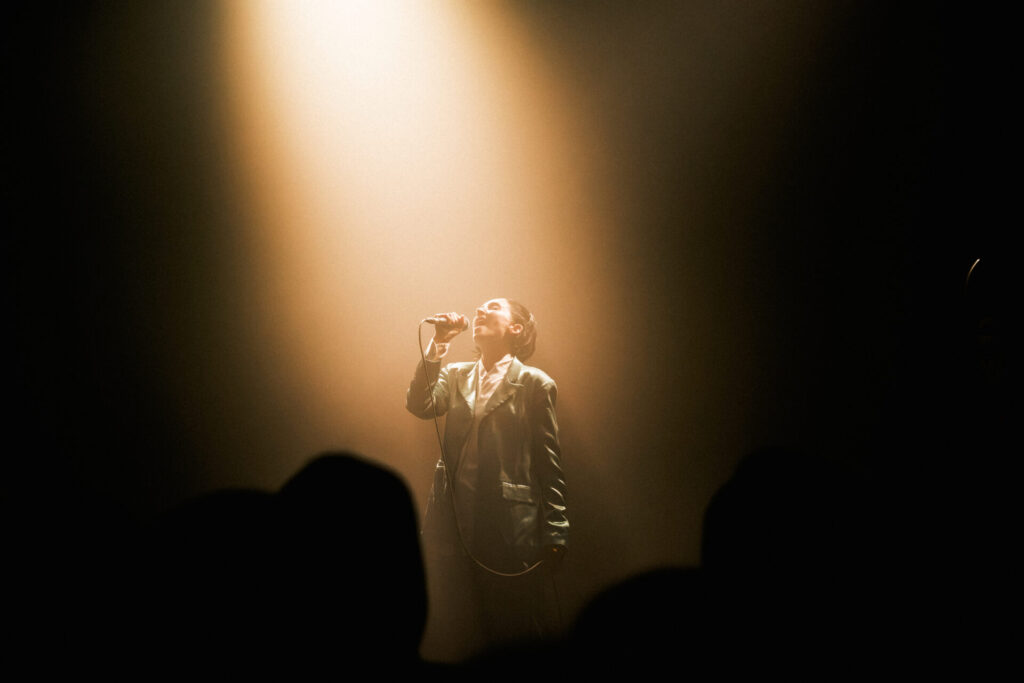
After a curtain-raising performance from the feminist collective F*Choir at the smaller XOYO, it’s Gazelle Twin who kicks off this year’s Supersonic proper – and who’s the first to perform in the newly integrated O2 Institute. As chain venues go this beautiful former Methodist chapel is as good as it gets, although you get the sense that Gazelle Twin’s powers of worldbuilding could transform a sweaty college portacabin into the environment she creates on latest project Black Dog, which sets an exploration of childhood terror and its repercussions in adulthood among the eerie disquiet of an English living room. Her stage setup is minimal – an armchair, a lamp and an old projector – but what she does within this space is totally overwhelming. She alternates between the chair – where she sits haunted, jerking as if in a nightmare – and centre stage, where she moves like she’s possessed in a grim, convulsive march. She also helms the projector to unspool eerie electronic loops, one of many moments in which edgy quiet juxtapose the tempestuous gales of bass that come elsewhere, most notably on the title track which explodes in darkness as gnashing spectral teeth fill the screen behind her. As well as providing effective expressionist imagery, the fact that the lighting’s arranged so the musician casts a shadow 50 times her size feels apt; as a representative of everything Supersonic stands for – the achievement of extraordinary art with the barest resources – this is the ideal opener.
Smote
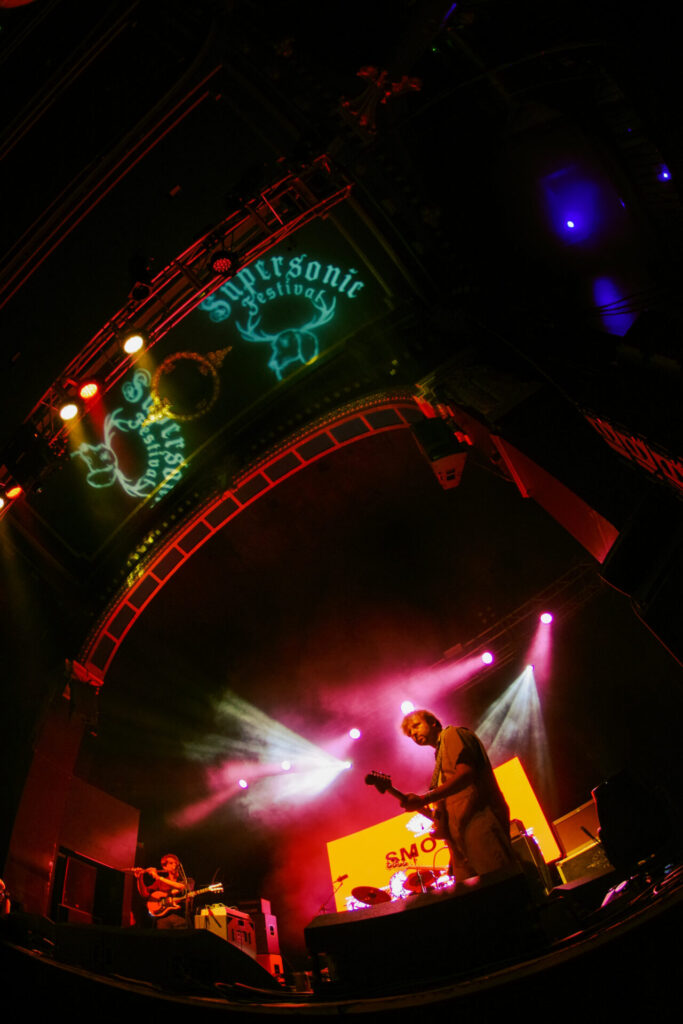
Smote – aka Daniel Foggin – joined live by guitarist Callum Church and bassist Sally Mason start their set facing away from the crowd, the heads of their guitars all pointing towards drummer Rob Law as if bowing down in reverence. For the duration of their set, its where their attention continues to be drawn, and the audience’s too. Law is a transfixing player, moving with such ease and precision it’s as if he’s being animated by something higher. His touch is light and yet the noise is deafening, a relentless stampede of a beat. As the rest of the band deliver heaving waves of feedback, the sounds swirl around that thundering centre, twisted and spaghettified as they’re sucked in by its immense gravitational pull. When Foggin takes to the flute, what should be delicate melodies are mutated into something that could accompany a battle march. When, for 30 seconds or so, the drums cease, it only leaves a yawning space where their presence used to be, and when they return the intensity is raised somehow even higher.
Senyawa
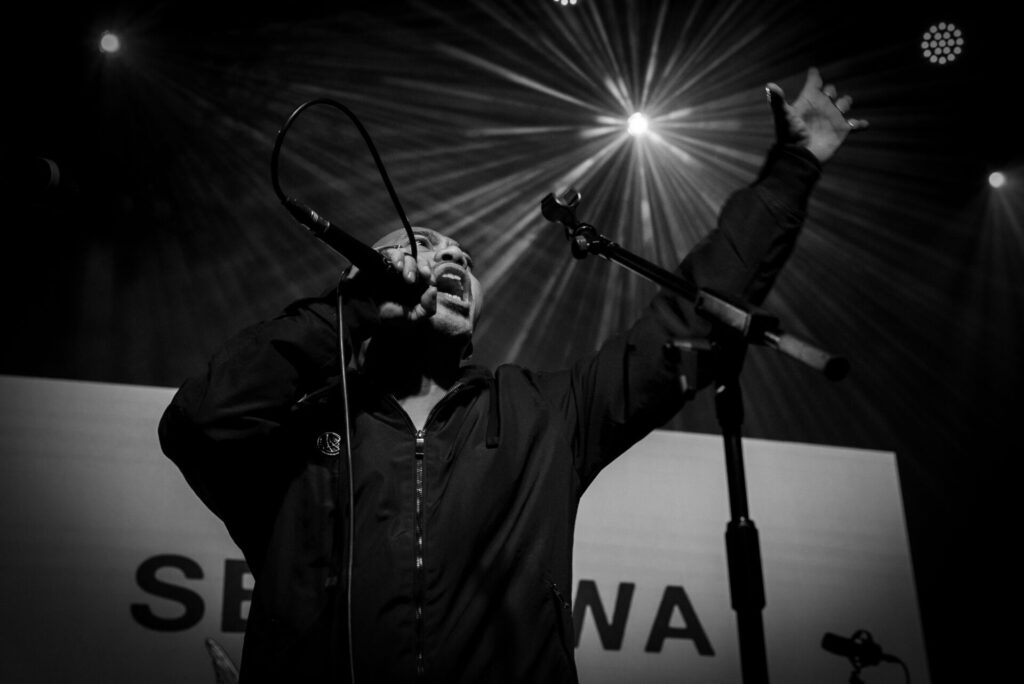
Going by word of mouth around the Supersonic site, Senyawa are one of the most anticipated sets of the weekend. That air of expectation is palpable as they arrive, vocalist Rully Shabara wielding two microphones and electronic triggers, percussionist Wukir Suryadi behind a self-created string instrument that he later tells tQ is called the Industrial Mutant. It was “born as a response to the power of industrialisation that changed the human soul without [us] realising it,” he explains. The two reach full momentum within seconds; sometimes Suryadi pounds his instrument, at others creates ear-splitting scratches by scraping it with an assortment of ragged bows and wires. Shabara assumes and sheds personas at the drop of a hat. He alternates between the two microphones, each of which provides different effects that allow his voice to shapeshift even more effectively. He’s incredibly expressive, his face contorting between emotions like he’s donning a series of ancient Greek theatre masks. It’s performative in the best possible way, delivering the themes of their new album Vajranala – which concerns power, ancient knowledge systems, mythology and ritual – as if the grandest of old operas. After 25 minutes of relentless playing, in which it feels like every emotional extremity imaginable has been captured, the pair finally grind briefly to a halt. “We are Senyawa, that was our first song,” Shabara says, brilliantly understated, as we, the onlookers, gasp for breath. The rest of the gig comes in shorter, more fragmented segments, and yet the intensity never drops a jot.
MC Yallah
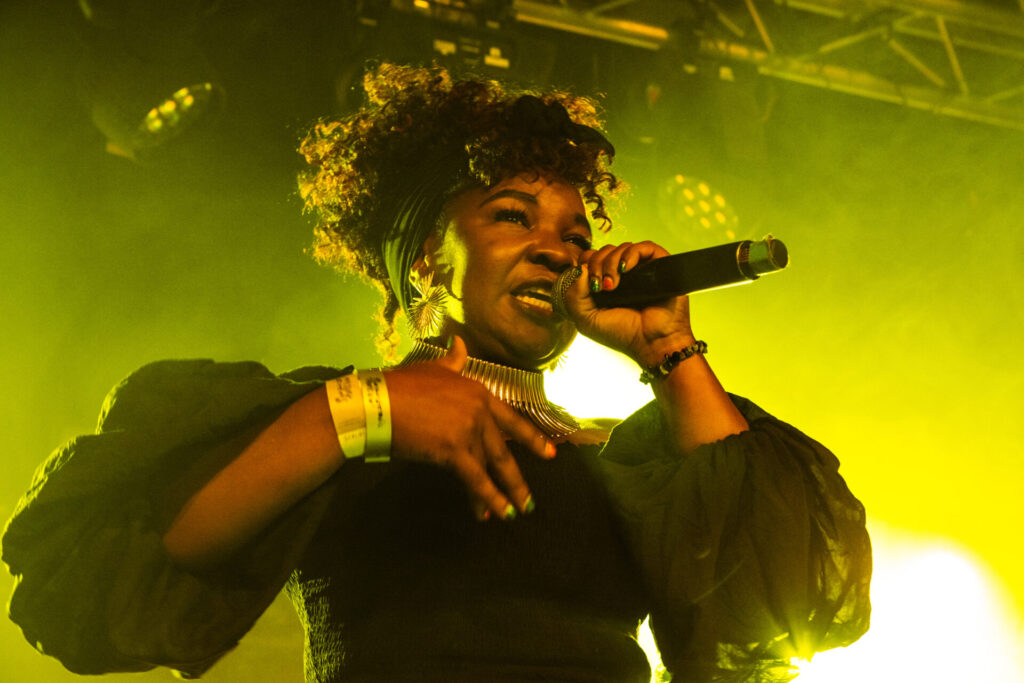
Even by Supersonic’s standards, the first two days of this year’s bill are heavy, and by late night on Saturday it’s hard to know if we can take another bludgeoning. It makes the energy with which MC Yallah arrives to XOYO all the more refreshing. Having been forced to cancel a scheduled appearance here last summer due to visa issues, she arrives beaming, and five minutes early. “It means a lot to be invited back,” she says, soaking up a wave of applause, before cutting short any pleasantries so she can launch straight into her set. It’s urgent and relentless – regular collaborator Debmaster providing brilliantly irregular beats. When the woozy sound of ‘Sikwebela’ arrives a quarter of the way through, an impeccable blast of staccato flow from Yallah kicks things up a notch further. By the end, she’s crammed two-dozen tracks into her hour – from straight-up club bangers to moody psychedelic grooves. It’s a performance that was well worth waiting a year for.
Daisy Rickman
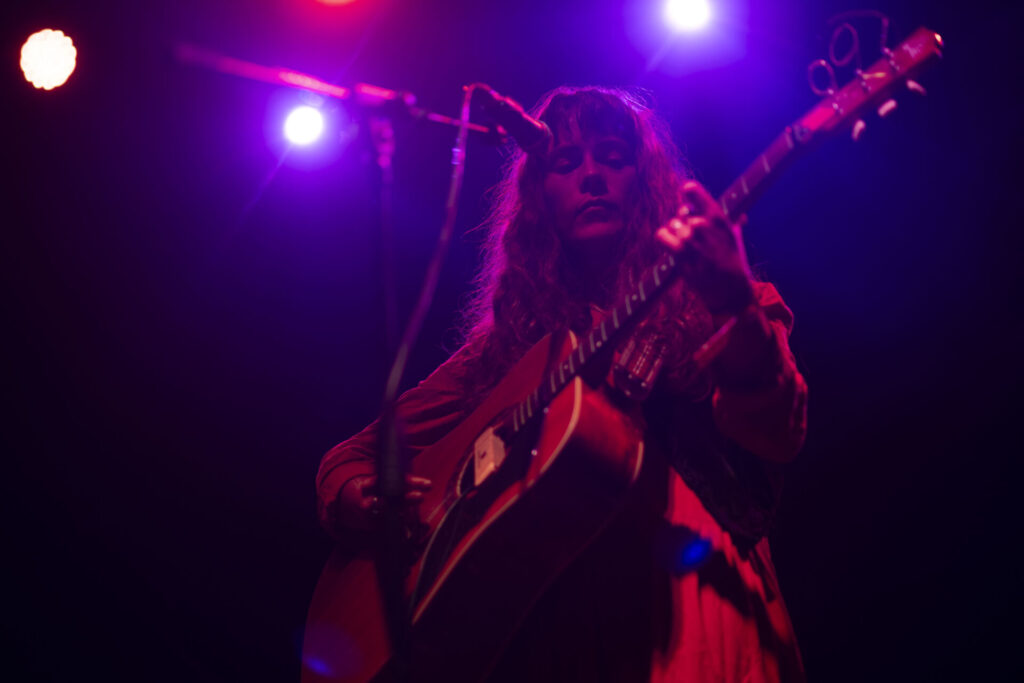
As was the case at last year’s edition, after the white-knuckle intensity of Friday and Saturday’s programming, Sunday begins on gentler footing, with Cornwall’s Daisy Rickman and her band the first of many left-field folk acts that dominate the final day’s billing. Sore feet among the faithful are made apparent by the amount of punters who seek seating in the upper balcony compared to those standing in the pit below. Rickman’s music – warm, mellow and inviting – provides the perfect salve. Her voice is quiet and understated when she speaks between songs, but then resounds with ageless depth when she sings, best evidenced in startling solo guitar track ‘Signpost To The Stars’. It would be unfair, however, to accuse Rickman and her musicians of softness; their subtlety and sleight of hand betrays the intense depth that lies behind these songs, a mixture of traditional and original material that is pushed into deeply hypnotic territory with just the slightest of inflections – a scratch of bow on a banjo, a flourish of rhythm, or the low rumble of electronic drone. It lends the set a simmering energy, which then boils over as Rickman swaps to the drums while the band weave a magnificent motoric groove around her.

